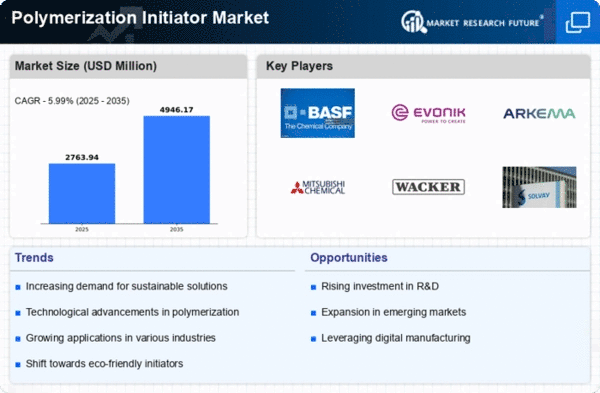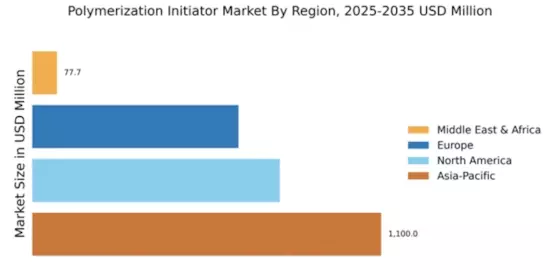Rising Demand for Polymers
The Global Polymerization Initiator Market Industry experiences a surge in demand for polymers across various sectors, including automotive, packaging, and construction. As industries increasingly adopt lightweight and durable materials, the need for effective polymerization initiators becomes paramount. In 2024, the market is valued at approximately 3250 USD Million, reflecting the growing reliance on these initiators to enhance polymer properties. This trend is expected to continue, as the market is projected to reach 5750 USD Million by 2035, indicating a robust growth trajectory. The compound annual growth rate (CAGR) of 5.32% from 2025 to 2035 further underscores the escalating demand for polymerization initiators.
Expansion of End-Use Industries
The expansion of end-use industries significantly impacts the Global Polymerization Initiator Market Industry. Sectors such as electronics, healthcare, and textiles are increasingly utilizing polymers for their unique properties, driving demand for effective polymerization initiators. For example, the electronics industry relies on polymers for insulation and circuit boards, while the healthcare sector uses them for medical devices and packaging. This diversification of applications fosters a broader market base for polymerization initiators. As these industries continue to grow, the demand for high-quality initiators is expected to rise, further propelling the market forward.
Globalization and Market Accessibility
Globalization has a profound effect on the Global Polymerization Initiator Market Industry by enhancing market accessibility and fostering international trade. As manufacturers expand their operations globally, the demand for polymerization initiators increases across various regions. This trend is particularly evident in emerging markets, where industrialization and urbanization drive the need for advanced materials. The ability to source initiators from different regions allows companies to optimize their supply chains and reduce costs. Consequently, the market is likely to benefit from increased competition and innovation, leading to a more dynamic and responsive industry.
Environmental Regulations and Sustainability
The Global Polymerization Initiator Market Industry is increasingly influenced by stringent environmental regulations and a growing emphasis on sustainability. Governments worldwide are implementing policies aimed at reducing the environmental impact of chemical processes, including polymer production. This shift encourages manufacturers to adopt eco-friendly initiators and processes that minimize waste and emissions. As a result, there is a notable rise in the development of bio-based and biodegradable polymerization initiators. This trend not only aligns with regulatory requirements but also meets the rising consumer demand for sustainable products, thereby driving growth in the market.
Technological Advancements in Polymerization
Technological innovations play a crucial role in shaping the Global Polymerization Initiator Market Industry. Advances in polymerization techniques, such as controlled radical polymerization and photopolymerization, enhance the efficiency and effectiveness of initiators. These developments not only improve the quality of the final products but also expand the range of applications for polymers. For instance, the introduction of new initiators that operate under milder conditions allows for the production of high-performance materials. As a result, the market is likely to witness increased adoption of advanced polymerization methods, contributing to the overall growth and evolution of the industry.


















